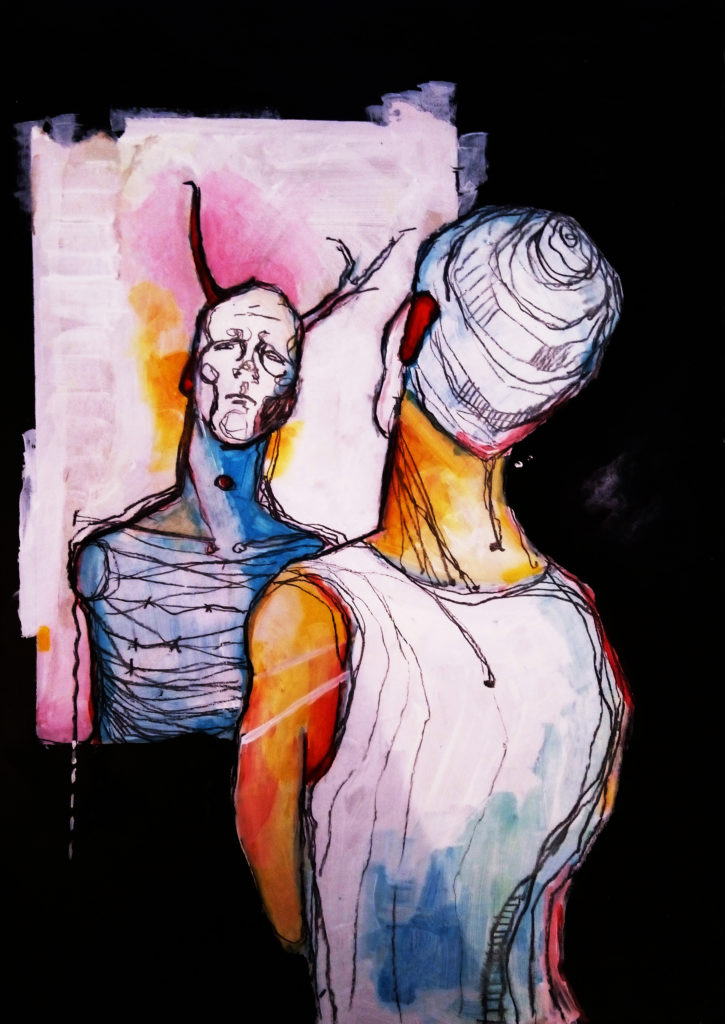
Tomorrow will be one week since the mall attack. Our roommates are out dancing. They’re younger than us, unmarried, work nine to five, and have been in Nairobi over a year. They live in large rooms featuring wood floors and built-in dressers. They lost a friend in the attack. Another friend, who survived, was on the cover of the Daily Nation; horrified eyes, cheeks streaked with dirt and blood.
We’ve been in Nairobi one month. We live in the servant’s quarters, the SQ they call it here. In three days, we’re moving across town to a neighborhood called Pangani. One of our roommates has never heard of Pangani. None of our roommates have been to Pangani. One of our Kenyan friends said, “Pangani? You can’t stay there!” We’re moving to be near Eastleigh, where S is doing research on Somali refugees. “At least you’re not right in Eastleigh,” one of our roommates says.
Our clothes are spinning in the laundry machine. One of our last loads before switching to buckets. Examining her face in the mirror, S sings “Joline.” I try to simultaneously floss and unravel the mosquito net. S says she’s aged a lot this year. “Look at these rings under my eyes.” I tell her it’s insulting, and that she’s in the top 0.01 percent of attractive human beings, and she has yet to hit her beauty peak. “That will happen at sixty.” She says she’s focusing on petty things to take her mind off the grave, and then follows up with, “What will happen after sixty?”
Our bed smells faintly of cat urine. We lock the SQ door. We spend the night squirming, pulling up and pushing down the blanket, and swatting at a hungry mosquito. We hear the apartment door open and then a tangle of high voices, laughter and clanking dishes.
I dream about eating mini Snickers, trapped in the apartment, provisions running low. We wake in the morning to the smell of coffee, hushed tones, and hurried footsteps. We wonder why they’re up early on a Saturday. We take our time getting out of bed. We go into the kitchen, then the living room. We peek down the hallway, all our roommates’ bedroom doors are open. I ask S where people go on Saturday mornings. “I know where they used to go,” she says.
We’re supposed to go to Tusky’s to buy a refrigerator, oven, and mattress for our new apartment. We signed our lease a week before the attack. We sit in the living room with our coffee and laptops. Merlin curled up on the couch. He’s devoured even the bone of his chicken wing breakfast. Construction noises. Sun beating through the windows’ bars. Our stomachs rumbling. Only bread and peanut butter in the pantry. A half-joking email from S’s dad, saying, “Grandma might be coming to get you; she’s eighty-six, but not without her faculties.” S writes back reminding him of 9/11, the Boston Marathon Bombing and the latest school and movie theater shootings. It feels scarier because we’re far away, she assures him.
In the afternoon we tiptoe next door to Atlantis and order nyama choma. Since the attack we’ve only left the apartment to buy groceries. We tell our waitress we’re in a hurry. The other patrons drink Tuskers and watch the Arsenal game. Cheering. Laughter. Bottles clanking. The smoky scent of roasted goat. Our gaze shifts from the television to our phones, to anyone who stands up or walks in. We scarf down the meat and don’t wait for our change.
The watchman swings open the gate and says, “Karibu.” Our living room is filled with our roommates and a few unfamiliar young women in long black dresses, smudged eye makeup. Guacamole and plantain chips on the coffee table. We greet them then disappear into the SQ, as it feels like something intimate has paused because of us.
The next night we eat dinner with our roommates. They tell us that one of the women in the apartment yesterday was Alex’s girlfriend. “It was a good day though. We all shared stories. He had so many plans.” We shake our heads over steamy bowls of ramen.
We move to Pangani. The caretaker smiles when he sees us, and says he was worrying that we were included in the casualties. We gradually furnish our apartment. There is an occasional explosion in our neighborhood. We get messages from family back home, making sure we’re okay. We write back, assuring them life is normal here. We are careful to choose our words carefully. We do our work. We go out to dinner with friends. We take matatus across the city. We buy vegetables from the neighborhood dukas. We try to calculate a risk that is impossible to calculate. We follow the protests in response to Michael Brown’s murder. We hang out on our balcony, watching shop-owners and customers converse, while drinking in the sun-soaked view of Karura Forest, bursting with jacarandas.
Michael Don is the author of the story collection Partners and Strangers (Carnegie Mellon University Press, 2019) and co-editor of Kikwetu: A Journal of East African Literature. His recent work has appeared in journals such as World Literature Today, J Journal, Washington Square Review, Vol. 1 Brooklyn, and The Southampton Review.
Tomislav Šilipetar was born in Zagreb. In 2014, he graduated from the Academy of Fine Arts in Zagreb in the class of Igor Rončević-Painting Department. In 2015, he became a member of HDLU. In addition to many group exhibitions, he had a number of solo exhibitions in Croatia as well as in the other countries. He is the winner of the Rector’s Award for Excellence in 2013. The paintings are mostly made in acrylic, and the themes vary from solitude and isolation to the very existence of human existence in the society that condemns. He favors simple colors and the line that goes perfectly with the total preoccupation of getting out of the ‘boxes’ of the academy.
